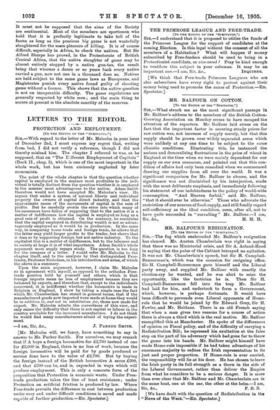[To THE EDITOR OP THE "SPECTATOR.")
SIE,—The fog which enshrouded Mr. Balfour's resignation has cleared. Mr. Austen Chamberlain was right in saying that there was no Ministerial crisis, and Sir A. Acland-Hood in saying that the pulse of the Cabinet betrayed no agitation. It was not Mr. Chamberlain's speech, but Sir H. Campbell- Bannerman's, which was the occasion for resigning office. Sir H. Campbell-Bannerman gave himself and the Liberal party away, and supplied Mr. Balfour with exactly the election-cry he wanted, and he was alert to seize the opportunity, like the tactician he is. Then Sir H. Campbell-Bannerman fell into the trap Mr. Balfour had laid for him, and undertook to form a Government, which, however, is perhaps fortunate. It would have been difficult to persuade even Liberal opponents of Home. rule that he would be joined by Sir Edward Grey, Sir H. Fowler, and Mr. Haldane. There is an old French saying that when a man gives two reasons for a course of action there is always a third which is the real motive. Mr. Balfour exemplified this at Manchester. He spoke of the differences of opinion on Fiscal policy, and of the difficulty of carrying a Redistribution Bill; he repressed his exultation at the false step on the part of his adversary which had gone far to throw the game into his hands. Mr. Balfour might himself have made Home-rule impossible if he had taken advantage of his enormous majority to reduce the Irish representation to its just and proper proportion. If Home-rule is ever carried, the responsibility will lie at his door. He has chosen to leave the Irish party in its full strength as a thorn in the side of the Liberal Government, rather than deliver the Empire from what he considers to be a serious danger. It is more than ever clear that Mr. Balfour and Mr. Chamberlain are in the same boat, one at the oar, the other at the helm.—I am,


















































 Previous page
Previous page